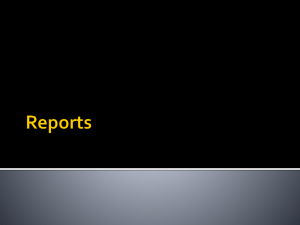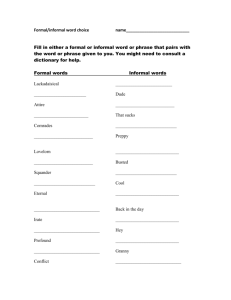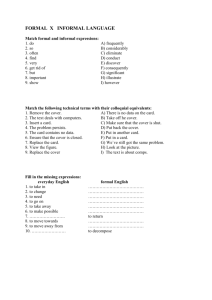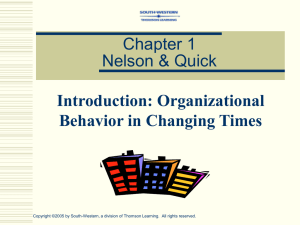View/Open
advertisement
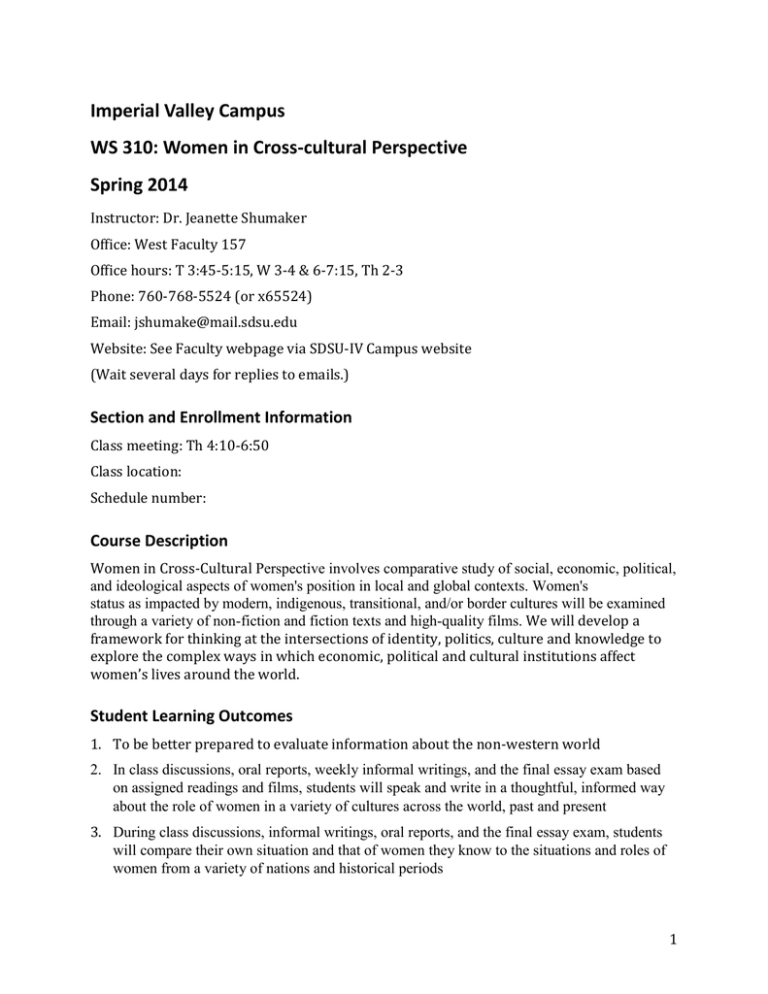
Imperial Valley Campus WS 310: Women in Cross-cultural Perspective Spring 2014 Instructor: Dr. Jeanette Shumaker Office: West Faculty 157 Office hours: T 3:45-5:15, W 3-4 & 6-7:15, Th 2-3 Phone: 760-768-5524 (or x65524) Email: jshumake@mail.sdsu.edu Website: See Faculty webpage via SDSU-IV Campus website (Wait several days for replies to emails.) Section and Enrollment Information Class meeting: Th 4:10-6:50 Class location: Schedule number: Course Description Women in Cross-Cultural Perspective involves comparative study of social, economic, political, and ideological aspects of women's position in local and global contexts. Women's status as impacted by modern, indigenous, transitional, and/or border cultures will be examined through a variety of non-fiction and fiction texts and high-quality films. We will develop a framework for thinking at the intersections of identity, politics, culture and knowledge to explore the complex ways in which economic, political and cultural institutions affect women’s lives around the world. Student Learning Outcomes 1. To be better prepared to evaluate information about the non-western world 2. In class discussions, oral reports, weekly informal writings, and the final essay exam based on assigned readings and films, students will speak and write in a thoughtful, informed way about the role of women in a variety of cultures across the world, past and present 3. During class discussions, informal writings, oral reports, and the final essay exam, students will compare their own situation and that of women they know to the situations and roles of women from a variety of nations and historical periods 1 4. In class discussions, oral reports, informal writings, and essay exams based on assigned texts, students will display their ideas about how the role of women has changed over time in many parts of the world, and how men’s roles are also changing today Prerequisite: Completion of the General Education requirement in Foundations of Learning II.B., Social and Behavioral Sciences required for non women’s studies majors. General Education: This is one of the nine courses that you will take in GE Foundations. Foundations courses cultivate skills in reading, writing, research, communication, computation, information literacy, and use of technology. They introduce you to basic concepts, theories and approaches in a variety of disciplines to provide the intellectual breadth necessary to help you integrate the more specialized knowledge gathered in your major area of study into a broader world picture. This course is one of two Foundations courses that you will take in the area of Social and Behavioral Sciences. Upon completing this area of Foundations, you will be able to 1) explore and recognize basic terms, concepts and domains of the social and behavioral sciences; 2) comprehend diverse theories and methods of the social and behavioral sciences; 3) identify human behavioral patterns across space and time and discuss their interrelatedness and distinctiveness; 4) enhance your understanding of the social world through the application of conceptual frameworks from the social and behavioral sciences to first-hand engagement with contemporary issues. Required Readings and Materials, available at IV Campus Bookstore Kristof, Nicholas and Sheryl WuDunn, Half the Sky ISBN 978-0-307-26714-6 $25 Lahiri, Jhumpa, Interpreter of Maladies ISBN 0-395-92720-X $15 Nafisi, Azar. Reading Lolita in Tehran ISBN 0-8129-7106-X $15 Course Website SDSU Blackboard Assessment and Grading Assignments and Exams Typed weekly informal writings on assigned readings and films (which can’t be turned in late) are worth 55% of the course grade; Your oral report, with Works Cited page, is worth 15%; Your Final Essay Exam on assigned readings and films is worth 20%; 2 Class participation and attendance is worth 10%. Final Course Grades 3.85 or higher = A 3.5-3.84 = A- 3.15-3.49 = B+ 2.85-3.14 = B 2.5-2.84 = B- 2.15-2.49 = C+ 1.85-2.14 = C 1.5-1.84 = C- 1.15-1.49 = D+ .85-1.14 = D .5-.84 = D- 0-.49 = F Grading Policies No weekly informal writings will be accepted late, even if an excuse of illness etc. is provided. This portion of the course grade is meant to reward students who manage to come to class well-prepared and on time despite the vagaries of life. No laptops, phones, iPods or iPads etc. may be used during class or the student’s class participation grade will be reduced. The same penalty is applied for holding side conversations during class. Class participation will be assessed via students’ willingness to speak up thoughtfully during class discussion along with their attendance. Course Activities and Schedule Date (Topic) Films TBA (Readings to be completed prior to class) (Assignments / Activities) 1/30 Slavery; grieving Half Intro and Ch 1; Interpreter Informal Writing “Temp. Matter”; Reading p.3-8 3 Date (Topic) Films TBA (Readings to be completed prior to class) (Assignments / Activities) 2/6 Prostitution; war Half Ch 2; Interp “Mr. Pirzada”; Informal Writing Reading 9-18 2/13 2/20 Speaking up; cultural clashes Half Ch 3; Interp “Interpreter”; Rape; schools for girls Half Ch 4; Interp “Real Durwan”; Informal Writing Reading 18-28 Informal Writing Reading 28-39 2/27 Honor and shame Half Ch 5; Interp “Sexy”; Informal Writing Reading 39-47 3/6 Death in Childbirth Half Ch 6; Interp “Mrs. Sen’s”; Informal Writing Reading 48-59 3/13 More on Maternal Deaths Half Ch 7; Interp “This Blessed House”; Reading 59-69 Informal Writing 3/20 Family Planning Half Ch. 8; Interp “Bibi Haldar”; Informal Writing Reading 70-77 3/27 Religion and women Half Ch 9; Interp “Third and Final”; Reading 81-91 Informal Writing 4/10 Education Half Ch 10; Reading 91-115 Informal Writing 4/17 Microcredit Half Ch 11; Reading 115-140 Informal Writing 4/24 Equality Half Ch 12; Reading 140-164 Informal Writing 5/1 What We Can Do; discuss Final Essay Exam Half Ch 13, 14. Reading 164-189 Informal Writing 5/8 Final Essay Exam on assigned books and films Bring all three books plus blue books and a pen. Review assigned books before class. 4 Date (Topic) Films TBA (Readings to be completed prior to class) 5/15 Present oral reports Turn in Works Cited list. (Assignments / Activities) Course Assignments Oral Report In ten minutes, present the ideas, themes, context, target audience and style of your assigned book. Discuss your reactions, comments and questions. Briefly outline your ideas for a lesson plan springing from this book for grades 8-12. Compare your assigned book to other books you have read, or have heard about in other students’ oral reports. If you wish, you may also summarize the author’s life. Hand in a works cited list when you give your talk. Final Essay Exam The final essay exam will be a series of essay questions answered in blue books. The exam will be open book, covering our assigned readings and films. A week before the exam, I will present some sample questions that won’t appear on the exam, and we will then discuss the content of the exam. Course Writing Assignments Weekly Informal Writings Each week, bring a typed, one-page discussion of the assigned readings and films, including reactions, comments and questions. Your weekly pages will guide our discussion of the assigned readings and films. Course Policies The oral report may be rescheduled if a student has a crisis, and makes arrangements for a different date in advance, not on the date of the oral report. Plagiarism or cheating will be punished by failing this course. In additon, I must report all cases of plagiarism and cheating to SDSU’s disciplinary office so that in cases of multiple infractions, SDSU may expel students if they so choose. Plagiarism involves copying other people’s work without giving them credit for it. For example, in the oral report, a student plagiarizes who quotes or paraphrases a source without identifying the source during the talk and in the works cited list. Another example of plagiarism is copying text from the internet or friend and then placing the copied text into the student’s informal writing or final essay exam. Talk with me if you need help avoiding plagiarism or cheating. 5 See Blackboard for a copy of the syllabus and other course documents. (Additional list items, as needed; add by pressing Enter; style is List Bullet) Students with Disabilities Students who need accommodation of their disabilities should contact me privately, to discuss specific accommodations for which they have received authorization. If you need accommodation due to a disability, but have not registered with Barbara Romero in Student Affairs, please do so before making an appointment to see me. 6

